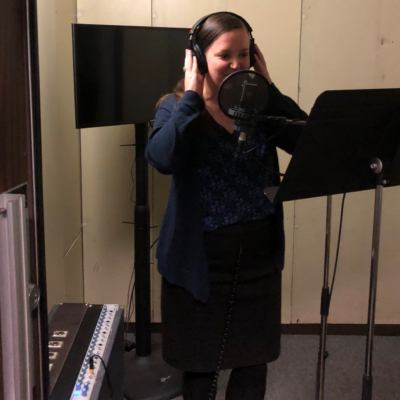| 00:00 |
ShortCuts Theme Music: |
[Piano Overlaid With Distorted Beat]
|
| 00:10 |
Hannah McGregor: |
Welcome to a new season of SpokenWeb ShortCuts. Each month on alternate fortnights (that’s every second week following the monthly SpokenWeb Podcast episode) join me, Hannah McGregor and our minisode host and curator, Katherine McLeod for SpokenWeb’s ShortCuts mini-series. We’ll share with you, especially curated audio clips from deep in the SpokenWeb archives to ask, what does it mean to cut and splice digitally? What kinds of new stories and audio criticism can be produced through these short archival clips? An extension of the ShortCuts blog posts on spoken web blog, this series brings Katherine’s favourite audio clips each month to the SpokenWeb Podcast feed. So if you love what you hear, make sure to head over to SpokenWeb.ca for more. [End Music: Piano Overlaid With Distorted Beat] Without further ado, here is Katherine McLeod with SpokenWeb ShortCuts, mini-stories about how literature sounds. [SpokenWeb Podcast Theme Music: Instrumental Overlapped with Feminine Voice]
|
| 01:18 |
Katherine McLeod: |
Welcome to ShortCuts, [Start Music: ShortCuts Theme Music] a place where we listen closely and carefully to short ‘cuts’ [Sound Effect: Scissors] from the audio collections of SpokenWeb. In this episode, we’ll be using the last full episode of The Spoken Web Podcast to inspire our listening. The last episode was “Lisa Robertson and the Feminist Archive”. The recordings that we’ll be listening to in this ShortCuts are of the poet bpNichol. We’ll mostly be listening to a recording of a reading that bpNichol gave on November 22nd, 1968, as part of the Sir George Williams Poetry Series. Now you might be wondering what does bpNichol have to do with “Lisa Robertson and the Feminist Archive”; well, I’m not here to make a case for what they have in common though, if I wanted to start somewhere, I’d start with Coach House Books. What I do want to draw upon from that episode on Robertson and the feminist archive is how producer Julia Polyck-O’Neill talks about archives as having an emotional weight. That emotional weight in the case of that episode was rooted in hearing a recording of someone’s voice, who is no longer here. Yes, this episode touches upon themes of loss, and please do what you need to do to take care while listening. [End Music: ShortCuts Theme Music]. BpNichol was a poet whose poetry was always aware of presence and absence through its linguistic play, concrete forms and embodied sound. Let’s hear how recordings of his voice invite us to think through and to feel the emotional weight of archives.
|
| 03:16 |
Archival Recording, bpNichol, November 1968: |
[Reading and singing a poem] What is a poem is inside of your body, body, body, body. What is a poem is inside of your head, inside your head, inside your head, inside your head. Oh…
|
| 03:34 |
Katherine McLeod: |
That was bpNichol reading, reciting, performing “Pome Poem.” It is a poem that I played years ago, over 10 years ago, in fact, as a graduate student, while presenting on a panel and a grand room at the University of Toronto. I had been discussing a dance adaptation of bpNichol’s poetry, and indeed a dance adaptation of his group, The Four Horsemen’s poetry and well, the performance is a story in and of itself. But to get to the point here, I was talking about how they had ended the performance with “Pome Poem,” and the sounds of the words breathing faded out as the theatre lights went down. I let the recording fade out at the end of my presentation.
|
| 04:20 |
Archival Recording, bpNichol, November 1968: |
[Reading/singing a poem] Inside of your, breathing, breathing, breathing, breathing, breathing, breathing, breathing, breathing, breathing, breathing [Fades out]…
|
| 04:32 |
Katherine McLeod: |
Afterwards, one of my co-panelists told me that he was very moved. He hadn’t expected to suddenly hear Nichol’s voice. It was as though he was there. This was years after the passing of Nichol and, with many recordings existing of Nichol’s voice, it didn’t seem strange for me to hear it. But here was someone who was not a Nichol scholar, he wasn’t listening to the audio recordings in the archives, but rather here, he was someone in the midst of a very public event who had just heard the voice of a dear friend. We can have such visceral reactions to hearing a voice in the archives, even if we don’t know that voice personally. I think of the reactions to Gwendolyn MacEwen’s voice – here’s Hannah McGregor and Jen Sookfong Lee reacting to MacEwen’s voice on a previous episode of The Spoken Web Podcast.
|
| 05:29 |
Audio Recording, Hannah McGregor: |
Have you ever heard her read?
|
| 05:30 |
Audio Recording, Jen Sookfong Lee: |
No. I’ve never heard her voice.
|
| 05:31 |
Audio Recording, Hannah McGregor: |
Do you want to?
|
| 05:31 |
Audio Recording, Jen Sookfong Lee: |
Yeah!
|
| 05:32 |
Archival Recording, Gwendolywn MacEwen: |
[Reading a poem] A fugitive from all those truths, which are two true, the great clawing ones and the fire breathers –
|
| 05:40 |
Audio Recording, Jen Sookfong Lee: |
[Audible Gasp]
|
| 05:41 |
Archival Recording, Gwendolywn MacEwen: |
– the ones that rake the flesh like piranhas and those that crush the bones to chalk and those that bare their red teeth in the night –
|
| 05:51 |
Audio Recording, Hannah McGregor: |
[Overlaps with MacEwen’s reading] So melodious her voice! I’ve never used the word melodious.
|
| 05:55 |
Archival Recording, Gwendolywn MacEwen: |
– My mind, emulates dragon, fish and snake and shoots fire to melt the Arctic night
|
| 06:00 |
Katherine McLeod: |
Melodious. Yes. So melodious her voice. And to be in awe of her voice has been a common response ever since MacEwen started reading poems in the 1960s. |
| 06:12 |
Katherine McLeod: |
Hearing MacEwen’s voice in the archives is somewhat similar to hearing bpNichol’s in that we’re hearing a poet who has been remembered as one who died too soon. BpNichol in 1988 at age 44 and Gwendolyn MacEwen one year earlier in 1987 at age 47. I think of George Bowering’s memorial for bpNichol in which he writes, quote: “as the years go by, scores of young and other writers and editors will develop the gifts bpNichol passed freely to them, and in that way, his life will go on. We will still bitterly resent the absence of his late life poems.” |
| 06:57 |
Katherine McLeod: |
I think of that too, for MacEwen. Her last book was called Afterworlds, but who is mourning the archival afterlife of MacEwen that we will never know – that we will never hear. There are many unheard archival afterlives that probably will come to mind as I say this. At the same time, Nichol and MacEwen were relatively well-known as poets in Canada, which makes you think about the voices that were never archived. And what about the voices who are recorded in the archives? But those recordings only capture certain periods of their lives and their work? Which versions of themselves are remembered in sound?
|
| 07:49 |
Archival Recording, bpNichol, November 1968: |
[Reading a poem] I wanted to forget you, so I tried to erase your name. I wanted to erase you, I forgot you, your name. I wanted you, I forgot you, I erased your name. You forgot me, I wanted you, you erased my name. I tried you, I forgot you, I erased your name. Wanting you, I forgot you. You erased my name. Erasing you, the wanting forgot, I tried your name.
|
| 08:31 |
Katherine McLeod: |
That was the last poem that bpNichol read in Montreal at the Sir George Williams Poetry Series on November 22nd, 1968, or at least we think that it was the last poem that he read. Nichol’s reading cuts in and out before we can hear the applause or any final remarks. And so we can only assume that it is the end. Plus the poem, as far as I can tell, is one that Nicol read out loud, but never published in print. And so we don’t know if this was “the end” of the poem. Though, if we listen closely, it does seem like it resolves and is even a bit reminiscent of his poem “Evening Ritual”, which evolves through a similar cycle of actions relating to writing. When the poem ends, at least as it ends on the tape, we don’t hear applause, but we can hear sound on the tape. The recording overlaps with a recording of the same recording. The recording somehow gets recorded over itself. And so there are times like this at the end, when you are listening to Nichol and then you hear the faint sound of Nichol in the background at a different point in the same reading.
|
| 09:49 |
Archival Recording, bpNichol, November 1968: |
[Reading a poem] Erasing you, the wanting forgot, I tried your name. [Static]
|
| 09:55 |
Katherine McLeod: |
Here’s another example of what I mean about the recording over itself, and this time we hear the tape rewind and then repeat something that we’d heard before.
|
| 10:06 |
Archival Recording, bpNichol, November 1968: |
[Voice sounds sped up] I’m going to read a poem I wrote last night. That’s waking [Tape noise of rewinding]…
|
| 10:14 |
Archival Recording, Lionel Kearns, November 1968: |
[Reading a poem] The imagination explodes. They grow old, quick and die. What’s left. Sometimes there’s something left. [Gentle laughter from audience]
|
| 10:35 |
Archival Recording, bpNichol, November 1968: |
I’m going to do that dangerous thing and read a poem I wrote last night, thus waking Lionel up at 7:30 this morning, which he didn’t quite forgive me for. It starts off with a quote from a poem by Bobby Hogg. And well, yesterday we were up in Carlton doing a reading there…
|
| 10:54 |
Katherine McLeod: |
This ShortCuts is being released right around the time when this reading took place. We can try to re-enact what it would have been like to gather on this November day in downtown Montreal for this reading with bpNichol and Lionel Kearns. What would it have been like to be in that room? What is the archive unable to record? By staging this ShortCuts in November with a November recording, we are participating in a kind of reenactment. To what extent are we trying, trying to remember or trying to erase a memory that may not be ours in the first place –
|
| 11:43 |
Archival Recording, bpNichol, November 1968: |
[Reading a poem] I wanted to forget you, so I tried to erase your name.
|
| 11:49 |
Katherine McLeod: |
–And yet having heard it, that memory can never be forgotten. The feeling of having heard it is still there.
|
| 11:58 |
ShortCuts Theme Music: |
[Piano Overlaid With Distorted Beat]
|
| 12:05 |
Katherine McLeod: |
ShortCuts is mixed and mastered by Judith Burr, hosted by Hannah McGregor and produced by me, Katherine McLeod. Head to SpokenWeb.ca to find out more about the sounds in this minisode and to learn more about SpokenWeb and The SpokenWeb Podcast. Thanks for listening. [End Music: Piano Overlaid With Distorted Beat] |

